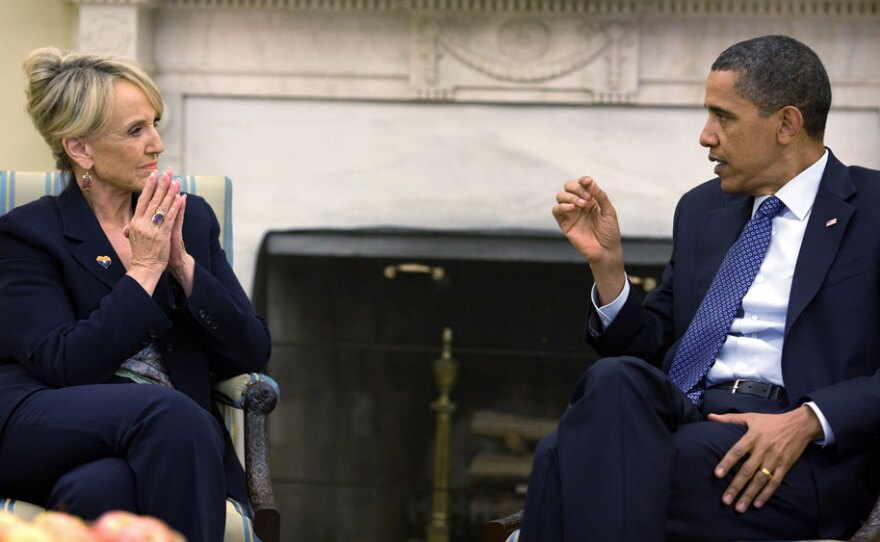The Justice Department's decision Tuesday to file suit against Arizona's controversial immigration law is likely to deepen divisions on an issue that has already become highly contentious.

"I'm a strong opponent of it," Tamar Jacoby, president of ImmigrationWorks USA, says of the lawsuit. Jacoby's business-backed group favors changes in immigration law that take into account labor force needs.
"They're stirring up a hornet's nest," she says. "Only the federal government can fix what's wrong with immigration -- but not with a lawsuit."
Despite months of backstage negotiations in the Senate, Congress appears hopelessly divided on immigration, with some members favoring an approach that would allow a path to citizenship for illegal immigrants already in the country and others seeking much harsher penalties for illegal immigrants and those who hire them. The looming midterm elections don't make finding a solution any easier.
And that political tension may be exacerbated by the Justice Department lawsuit, which seeks an injunction to block implementation of the Arizona law. The law calls on police to check the legal status of individuals who they have reason to suspect are in the country illegally after they have been arrested or stopped for some other infraction. Polls show it is broadly popular both within the state and nationwide. Several states are considering passing similar legislation.
The President's Political Problem
President Obama has been in a box when it comes to immigration. He has been unable to persuade Congress to consider seriously legislation that will secure the borders, without cracking down harshly on illegal immigrants.
They're stirring up a hornet's nest.
In the face of such inaction -- a point of deep frustration with Hispanic voters -- Obama has taken several symbolic steps recently in a bid to demonstrate his continuing concern. They include private meetings with pro-immigration groups and a speech last week in which he argued that partisan divisions are interfering with crafting comprehensive legislation.
But this latest step -- having the administration's lawyers argue that states lack the authority to pass their own immigration enforcement laws -- will anger states' rights advocates.
It may also breed ill will among senators such as Jon Kyl of Arizona, the Senate Republican whip, whose support or at least acquiescence is crucial to passage of immigration legislation in Congress.
"This is likely to inject immigration into races around the country, generate big opposition and anger the senator the president needs the most," Jacoby says.
The Legal Debate
The federal government's legal case turns on the question of pre-emption -- the notion that only Washington has the authority to set immigration policy. The Justice Department's complaint says that Arizona's statute, which Republican Gov. Jan Brewer signed in April, "is preempted by federal law and therefore violates the Supremacy Clause of the United States Constitution."

Enforcement of immigration law might seem like a natural area for federal law to take precedence. "Very quickly, we would end up with 50 states with 50 different types of immigration law," says Ali Noorani, executive director of the National Immigration Forum, an immigrant advocacy organization. "To avoid that catastrophe, the Obama administration has stepped in and said there's one immigration law, and that's the federal law."
But in recent years states have passed hundreds of laws addressing immigration -- laws that survived earlier court challenges raising pre-emption concerns. And the Arizona statute was crafted specifically with this constitutional question in mind. Some of its most contentious language was derived directly from existing federal laws.
"What the federal government might have to argue, in effect, is that it is not [its] policy to enforce federal immigration law," says Steven Camarota, director of research at the Center for Immigration Studies, which favors stricter enforcement of immigration laws. "They would be on stronger ground saying that Arizona is doing something contrary to the policy of the federal government."
Potential Fallout From The Suit
The arguments made by the Justice Department in its complaint are not so different from challenges that have been brought against the Arizona law by private groups such as the Mexican American Legal Defense and Education Fund and the American Civil Liberties Union.
But having the federal government itself weigh in and say that immigration is a national concern over which states have limited purview may hold more sway with a judge.
"My sense is that the issue here of pre-emption really goes to the core of the role of the federal government," says Clarissa Martinez De Castro, director of immigration and national campaigns at the National Council of La Raza, a Latino civil rights and advocacy group. "There's really no alternative than for the Justice Department to intervene."
Regardless of the outcome in court, however, supporters of the Arizona law predict there will be political fallout.
"Politically, it is odd, because going after the Arizona law is going to outrage the average of 65 percent of Americans in polls that support it," says Bob Dane, spokesman for the Federation for American Immigration Reform, which helped draft the Arizona law. "It's going to inject immigration into campaigns from coast to coast, which is going to endanger mostly moderate Democrats."
Obama has been opposed to the law from the start, pleading publicly with Brewer to veto it just hours before she, in fact, signed it. But the lawsuit may further complicate the president's desire to find some daylight between seemingly diametrically opposed camps in Congress on the immigration issue.
"I'm no fan of the [Arizona] law," says Jacoby, the ImmigrationWorks USA president, "but I'm very frightened that the lawsuit will polarize the debate to the point of no return."
Copyright 2022 NPR. To see more, visit https://www.npr.org. 9(MDAzMjM2NDYzMDEyMzc1Njk5NjAxNzY3OQ001))





